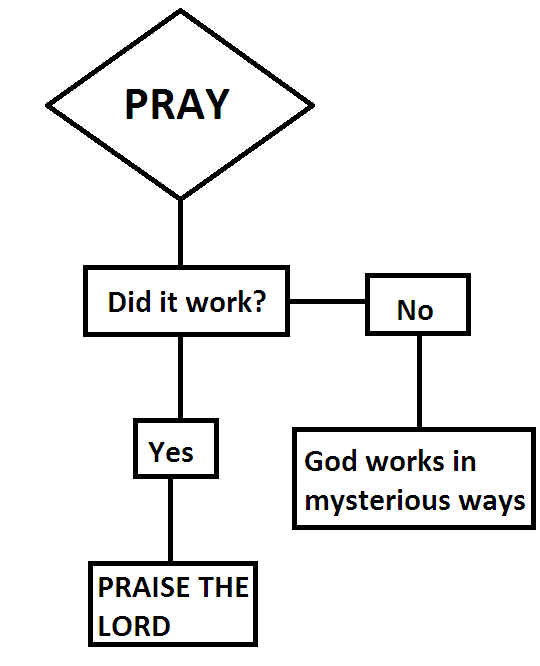Today is the National Day of Prayer. As a lawyer, I was surprised to learn that National Day of Prayer is codified into the United States Code (36 U.S.C. § 119):
- The President shall issue each year a proclamation designating the first Thursday in May as a National Day of Prayer on which the people of the United States may turn to God in prayer and meditation at churches, in groups, and as individuals.
How the National Day of Prayer has survived so long in view of the Establishment Clause is beyond me. While it does not, on its face, favor a particular religion, its history clearly proclaims itself as a day of Christian prayer. Like "one nation under God" in the Pledge of Allegiance, the National Day of Prayer is a creation of the 1950s. On April 17, 1952, President Truman signed a bill proclaiming a National Day of Prayer must be declared by each following president at an appropriate date of his choice. In 1982 a conservative evangelical Christian organization called the "National Prayer Committee" was formed to coordinate and implement a fixed annual day of prayer for the purpose of organizing evangelical Christian prayer events with local, state, and federal government entities. The National Prayer Committee is active to this day, advancing the cause of Jesus. Google "national prayer committee" and you will see its motto, "Centered on the Lord Jesus Christ."
Fortunately, this might be one of the last National Days of Prayer. The Freedom From Religion Foundation (FFRF) sued to challenge the designation of a National Day of Prayer on October 3, 2008. On April 15, 2010, U.S. District Judge Barbara Crabb ruled that the statute establishing the National Day of Prayer was unconstitutional as it is "an inherently religious exercise that serves no secular function." Judge Crabb also stated in her opinion, "If the government were interested only in acknowledging the role of religion in America, it could have designated a 'National Day of Religious Freedom' rather than promote a particular religious practice." However, Crabb stayed her ruling pending the completion of appeals.
The U.S. Department of Justice filed a notice to appeal the ruling on April 22, 2010, and on April 14, 2011, a panel at the Seventh Circuit Court of Appeals unanimously overruled Crabb's decision, stating that "a feeling of alienation cannot suffice as injury." They further stated that the President is free to make appeals to the public based on many kinds of grounds, including political and religious, and that such requests do not obligate citizens to comply and do not encroach on citizens' rights. The same day, the Freedom From Religion Foundation announced that it would seek an en banc review of the ruling by the full Seventh Circuit court.
Hopefully, the decision will be reversed by the full Seventh Circuit. If not, the case may go to the Supreme Court. As a secularist, I can only hope that the law is struck down as a clear violation of the Establishment Clause of the First Amendment.
For those who are participating in the National Day of Prayer, I hope that they consider the study from 2006 concerning the efficacy of prayer. Link to NYTimes Article. Not only did prayers offered by strangers have no effect on the recovery of people who were undergoing heart surgery, patients who knew they were being prayed for had a higher rate of post-operative complications like abnormal heart rhythms. http://www.nytimes.com/2006/03/31/health/31pray.html?_r=1&pagewanted=all
If that isn't convincing enough, consider the following statistics:

Also, think the contradiction of asking God to stop what he ostensibly set into motion or decided not to prevent in the first place:

Similarly, consider the futility of praying for something that is not already in the divine plan:

Next, ask yourself how you will know whether God actually answered your prayer:

Finally, ask yourself whether prayer increases or decreases your willingness to do something other than talk about what you wish would happen.

 - Reference no. 1 represents Kolob
- Reference no. 1 represents Kolob